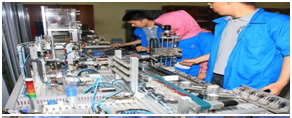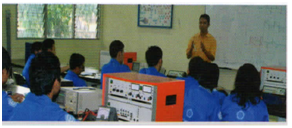Introduction
Vision
Toward the center of professional education provider in the field of electronics, especially instrumentation, microprocessor, system control and maintenance repair.
Mission
- Producing qualified, deciplined, creative, innovative, good moral graduates who have competence in instrumentation, microprocessor, system control and maintenance repair;
- Developinganddisseminatingelectronics throughresearch, professional training, andcommunity services;
- Providingprofessional educationthat can generate skilled, independentandprofessional graduates, provide professional trainingandcooperate with public, industry, governmentandstate owned companies.
Purposes
The purpose to be achieved by the D III Program of Electronics Engineering in accordance with the vision and mission is to produce mid-level managers, who have the values and attitudes of independent, responsible in carrying out their duties, especially in the fields of instrumentation, microprocessor, system control and maintenance repairs and have the ability to design, realize, test and modify electronic circuits.
Targets
Based on the purpose of Electronics Engineering Program that is to produce mid-level managers that have the ability to design, realize, test and modify electronic circuits, the targets of electronics engineering are as follows:
- At least 75% of graduates’GPA≥3.00(range 0-4) /academic year;
b. At least 50% of graduates’ waiting period to get first job ≤ 6 months;
c. At least 80% of graduates have one type of certificate of competence;
d. At least 50% of graduates’ TOEIC score ≥ 350
Strategies to Achieve Targets
- Improvingmethods, mediaandmaterialsstructurally based on syllabus, SAP, andteaching and learningcontracts. The total number of instructionalhours is at least ≥90%;
- Carrying outtracer studytoindustry, state owned companies or private companieswhich are closely relatedto Electronics field and forming partnership withgraduateswho workinindustriesoragencies in order toobtaininformationabout job vacancies;
- Conducting Training and competency testing in instrumentation (sensors and electric motors), microprocessors, control systems (PLC) and maintenance;
- Improving students’ English abilityandgetthem to speak English during seminar/discussion/debate/teaching and learning process.
Learning Outcomes
The learning outcomes of Electronics Engineering Program among others are:
- Personality
Honesty, dedication, hard work, future vision, team work capability, ability to work under pressure , high disciplined, high creativity , leadership skills , independence and good communication skill.
b . Science mastery and Skills
Excellent mastery of basic science for basic of engineering. Mastering the principles and techniques of electronics design such as automatic control using a microcontroller, PLC , instrumentation, and mastering computer application in electronics such as Protel , EWB , Livewire , Pinnacle and Matlab computer programs and applications in microcontrollers such as Assembly , Basic and the C + + language , in order to be able to work as supervisor , project implementers , supervisors , marketing engineer , supervisor / bureaucrats in state owned companies or private companies , and self-employed .
c . Working capability
– Able to design electronic systems in the field of; Microcomputer , Microcontroller , Mechatronics , Programmable Logic Controller ( PLC ) , Instrumentation , and master software applications and hardware ( Programmable Devices ) as the cornerstone of electronic system implementation as well as network and information technology applications in supporting electronic system performance;
– able to design implementation by paying close attention to design details and quality control ;
d . Attitudes and Behavior at Work
Professional, able to work in team, prioritize security and safety , economy-minded, provide quality assurance and understand the concept of report writing .
e . Social values
- Responsible for individual work and team work, communicative, good attitude, appreciative and active .
- Able to evaluate and manage themselves and effectively communicate information and ideas in various forms of electronics media in electronics to public.
Graduates’ Competences
CORE COMPETENCIES
- Master basic principlesofinstrumentation, controlsystems, microprocessorsandmaintenance repair;
- Able torunbasicandadvancedapplication(practice) ofthe theory ofinstrumentation, controlsystems, microprocessorsandmaintenancerepair;
- Ableto design/create anew design, test andmodifyelectronic circuits.
SUPPORTING COMPETENCES
- The ability ofcomputerprogramapplicationsinthe field of electronicssuch asProtel, EWB, Livewire, PinnacleandMatlab;
- The ability ofcomputerprogramapplicationsinthe field ofmicrocontrollerssuch asAssembly, BasicandC++languages.
OTHER COMPETENCES
1. Able to communicate internationally / able to speak a foreign language;
2. Able to work in public life;
3. Entrepreneurship skills in the field of electronics.
Training Service
Training on Microprocessor
Facilities
– Air conditioned class rooms with LCD Projectors, Wall Screen Projectors
– PCB (Printed Circuit Board) Realization and Wiring Workshop
– Electronics Engineering Workshop
– Microprocessor Lab
– Instrument Lab
– Automatic Control Lab
– Analog / Digital Labs
– Maintenance and Repair Lab
– Mechatronics Lab
– Library
– Student Center
– Mosque
– Sport facilities
– Academic Advisor


